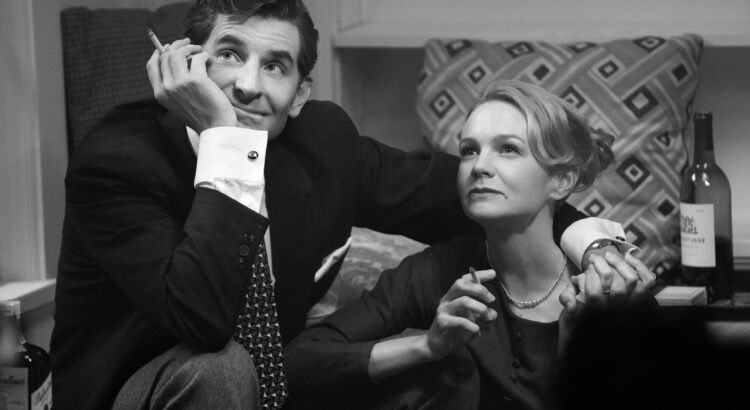The long-awaited Leonard Bernstein biopic came to theaters on November 22nd. With an unmatched legacy in the classical music-sphere, Maestro offers us a unique look into the personal life of the first American-born composer to receive international acclaim.
Director and lead Bradley Cooper led a gripping performance as the conductor extraordinaire, providing a rare glimpse into the world of the beloved American conductor. I was interested to see what parts of Bernstein’s life would be highlighted in the film, as he lived quite a vehement life, filled with passionate successes and seething controversy. With so many notable musical moments that Bernstein boasts, the movie is rather centered around his tumultuous marriage with actress Felicia Montealegre (Carey Mulligan) rather than much of his career work.
The film begins with a spritely 25-year-old “Lenny” (as he was often referred to) and progresses with early career successes until he meets Felicia at a house party in 1946. They marry in 1951 and the story uncovers the beauty and bitterness behind their marriage, alongside Lenny’s confusing journey with his sexuality. The story feels complete marriage-wise, but lots of questions about his queerness remain.
The movie presents Bernstein’s life as a constant performance. His inherent presentational-based occupation and obsession with the media seep their way into Lenny’s marriage. This is shown in the way he falls in love: with choreographed dance numbers and flirtatious rehearsals on stage with Felicia. As well as the lavish parties he throws later in life with famous patrons who are watching his every move. His romance with Felicia always remained public in this sense, while his relationships with men were consistently private. Additionally, this was an interesting way to highlight the oppressive culture surrounding queerness in the 20th century. One of my favorite aspects of the film was the contrast between the unmarried and married Lenny. This shift is shown in the cinematography, with a black and white filter over his life while he is falling in love with Felicia, and a shift to bright color into the later years of their marriage, when more problems come to life.
The film did not necessarily showcase all the music he created or the specific legacy he desired, but it was a brilliantly crafted story that explored deeply into the musician’s marriage and sexuality. This movie is thoughtful and heartbreaking with overwhelming passion—much like the music Leonard Bernstein created himself. Maestro is in theaters for a limited time and is now available on Netflix.

Bradley Cooper (left) and Carey Mulligan.
129 minutes. Rated R for discreet nudity and a ton of cigarettes.
Image thanks to Movie Insider and Netflix.



